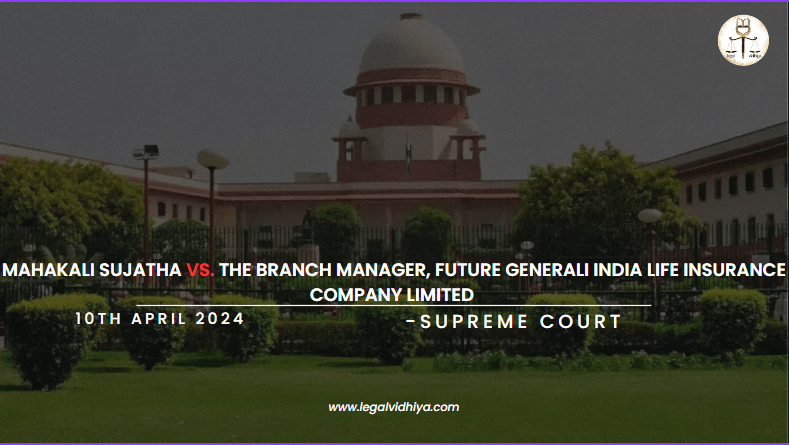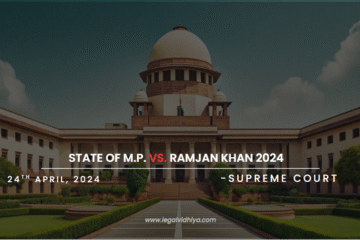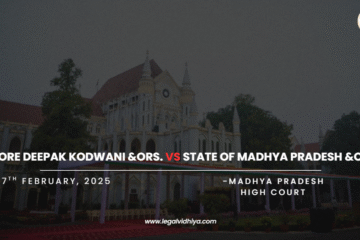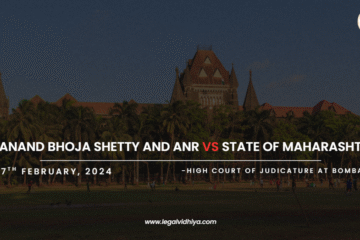
| CITATION | 2024 INSC 296 |
| DATE OF JUDGMENT | 10th April 2024 |
| COURT | Supreme Court of India |
| APPELLANT | Mahakali Sujatha |
| RESPONDENT | The Branch Manager, Future Generali India Life Insurance Company Limited & Another |
| BENCH | Justice B.V. Nagarathna, Justice Augustine George Masih |
INTRODUCTION
The case of Mahakali Sujatha Vs. The Branch Manager, Future Generali India Life Insurance Company Limited & Another, revolves around the repudiation of an insurance claim based on the alleged non-disclosure of existing life insurance policies by the insured-deceased. Mahakali Sujatha, the appellant and daughter of the insured-deceased, challenged the insurance company’s decision to repudiate the claim, which was initially upheld by the National Consumer Disputes Redressal Commission (NCDRC). This case involves multiple levels of judicial scrutiny, beginning with the District Commission and moving through the State Consumer Forum before reaching the Supreme Court of India.
FACTS OF THE CASE
- The complainant’s father obtained two insurance policies from the insurer: one for Rs. 4,50,000 and another for Rs. 4,80,000, providing for double the sum assured in the case of accidental death.
- In the application forms for these policies, the insured-deceased was asked about any existing life insurance policies with other insurers and he responded negatively.
- The complainant, the daughter of the insured-deceased, was nominated to receive the benefits under both policies.
- The insured-deceased died in a train accident, leaving the complainant as his sole legal heir and nominee.
- The complainant notified the insurer of her father’s death and submitted the necessary claim forms and documents.
- The insurer repudiated the claims, alleging that the insured-deceased had suppressed material facts by not disclosing existing life insurance policies with other insurers.
- The insurer’s investigation revealed that the insured-deceased had substantial life insurance coverage from other companies, which was not disclosed in his application forms.
- The insurer concluded that the non-disclosure affected their underwriting decision, and as a result, repudiated the claims based on the principle of utmost good faith.
- Aggrieved by the repudiation, the complainant filed a consumer complaint with the District Commission at Vijaywada.
- The District Commission ruled in favour of the complainant, stating that there was no documentary evidence to prove the insured-deceased had other policies. They found a deficiency in service by the insurer and ordered them to pay Rs. 7,50,000 and Rs. 9,60,000 with 6% interest from the date of claim rejection, along with costs of Rs. 2000.
- The insurer appealed to the State Consumer Forum, which dismissed the appeal. The State Commission found no material evidence of suppressed information and ruled that non-disclosure of other policies did not constitute suppression of material facts, upholding the District Commission’s decision.
- The insurer then filed a revision petition with the NCDRC, which agreed with the insurer. The NCDRC found that the insured-deceased had indeed withheld information about other insurance policies.
- The NCDRC relied on a Supreme Court judgment which upheld repudiation of claims for non-disclosure of existing policies. Consequently, the NCDRC allowed the insurer’s revision petition and dismissed the consumer complaint.
- The complainant has now filed a Special Leave Petition against the NCDRC’s judgment.
ISSUES RAISED
- Whether the insurance company’s repudiation of the claim was justified based on the non-disclosure of information regarding existing life insurance policies by the insured-deceased.
- Whether the insured’s non-disclosure of existing life insurance policies constitutes a material suppression of facts.
- Whether the insurance company adequately discharged the burden of proof to support the rejection of the claim due to the alleged material suppression of information..
- Whether the principle of “uberrimae fidei” (utmost good faith) was breached by the insured-deceased.
CONTENTIONS OF APPEALENT
- The appellant argued that the insurance company failed to provide proof that the insured-deceased had multiple insurance policies at the time of applying for the subject policy.
- They contended that there was no material suppression of facts as alleged by the insurer. The insurance company did not provide documentary evidence to support the claim of material suppression by the insured.
- They further contended that the National Consumer Disputes Redressal Commission (NCDRC) was incorrect in upholding the repudiation of the claims despite the lack of evidence.
- The Appellant emphasizes that the burden of proving material suppression lies with the insurance company. Since no documentary evidence was presented during the proceedings to substantiate the claim of undisclosed policies, the repudiation of the claim is unjustified.
CONTENTIONS OF RESPONDENT
- The respondents argued in favour of the NCDRC’s decision and claimed that the insured deceased had fifteen other insurance policies worth Rs. 71,27,702/- before obtaining the subject policies.
- They argued that the deceased had deliberately failed to disclose these existing policies, which was a material fact essential for assessing the risk and deciding whether to issue the insurance policies.
- The respondents asserted that insurance contracts are based on the principle of utmost good faith, and the insured’s failure to disclose other policies was a significant breach of this principle.
- They claimed that the insurance contract was void due to this material suppression of facts, thus justifying the repudiation of the insurance claims.
- The deceased’s non-disclosure of existing policies would have significantly affected their decision to issue the insurance.
- The respondent argued that their action was in compliance with Section 45 of the Insurance Act, 1938, which allows insurers to repudiate claims within two years from the date of issuance if material facts are suppressed.
JUDGEMENT
The Supreme Court, after considering the arguments and evidence presented by both parties, allowed the appeal filed by Mahakali Sujatha against the repudiation of the insurance claim by Future Generali India Life Insurance Company Limited. The Court found that the insurer failed to provide sufficient documentary evidence to prove that the insured-deceased had other insurance policies which were allegedly not disclosed. Consequently, the repudiation of the claim was deemed unjustified. The Supreme Court set aside the NCDRC’s decision and directed the insurance company to pay the claim amounts under the two policies to the appellant, along with interest at the rate of 7% per annum from the date of filing the complaint until realization. Both parties were directed to bear their respective costs.
ANALYSIS
The case centered on whether the insured-deceased had failed to disclose existing insurance policies when obtaining new ones from Future Generali India Life Insurance Company Limited. The insurer claimed this non-disclosure justified repudiation of the new policies under the principle of utmost good faith (uberrimae fidei) and Section 45 of the Insurance Act, 1938, which allows repudiation within two years if material facts are suppressed. However, the Supreme Court found the insurer’s evidence insufficient to support this claim. The Court emphasized that non-disclosure of existing policies could indeed be material, but the insurer needed clear evidence of such policies at the time the new ones were taken out. The burden of proof rested on the insurer, who failed to provide original or authenticated documents proving the existence of the undisclosed policies, thus failing to establish material suppression of facts. Despite the principle of utmost good faith being fundamental to insurance contracts, the Court ruled there was no breach by the insured-deceased due to the insurer’s lack of proof. The Supreme Court criticized the NCDRC for supporting the insurer’s decision without demanding adequate evidence, marking this as a significant error. Furthermore, the Court applied the contra proferentem rule, which interprets any contract ambiguity against the insurer, thereby favoring the appellant due to the insurer’s insufficient evidence.
CONCLUSION
This case addressed the critical issue of whether an insurance company can justifiably repudiate a claim based on the alleged non-disclosure of existing life insurance policies. The Supreme Court rendered a pivotal judgment in favor of Mahakali Sujatha, emphasizing the insurer’s failure to provide sufficient documentary evidence to prove the alleged non-disclosure. The Court underscored the insurer’s burden of proof in establishing material suppression of facts and reinforced the principle that ambiguities in insurance contracts should be interpreted against the insurer. By setting aside the NCDRC’s decision, the Supreme Court directed the insurance company to honor the claim, highlighting the necessity for concrete evidence in insurance disputes and ensuring fairness in the claims process. This judgment reaffirms the importance of transparency and adherence to statutory requirements in the insurance sector, protecting policyholders’ rights and maintaining the integrity of insurance practices.
REFERENCES
This Article is written by Ananya Saren student of Surendranath Law College, University of Calcutta; Intern at Legal Vidhiya.
Disclaimer: The materials provided herein are intended solely for informational purposes. Accessing or using the site or the materials does not establish an attorney-client relationship. The information presented on this site is not to be construed as legal or professional advice, and it should not be relied upon for such purposes or used as a substitute for advice from a licensed attorney in your state. Additionally, the viewpoint presented by the author is of a personal nature.




0 Comments